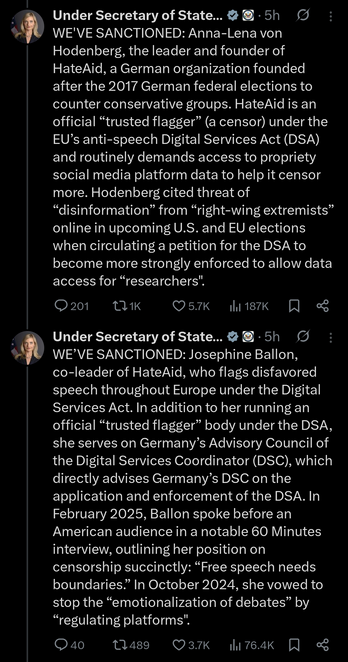2025-12-05 18:43:44
It may well be that the so-called political elite surrounding Darth #Trump is currently incapable of rational thinking and is causing a lot of damage (including to US interests). But I believe that there are still strategists, particularly in the military (who are not related to Trump ;-), who will ultimately step in to put the brakes on.
Trump's EU policy is also damaging US interests enormou…
2025-12-02 10:40:52
Americans express fear and negativity toward AI, often relying on bad arguments like water usage, a stark contrast with Asia and Europe's relative positivity (Noah Smith/Noahpinion)
https://www.noahpinion.blog/p/i-love-ai-why-doesnt-everyone
2025-12-24 02:12:44
Auch wir vom Team Troet.Cafe sprechen unsere ungebrochene Solidarität mit @… aus, dessen Leitung momentan von der U.S. Regierung mit Sanktionen angegriffen wird.
Der Präsident des Internationalen Strafgerichtshof erhielt auch eine Sanktion dieser Art, für ihn hieß das: Einreiseverbot, Schließung seiner Bankkonten, Schließu…
2025-12-09 15:42:51
Members of Congress are routinely escorted through airport security,
but the process does not normally result in profanity-laced airport tirades
Police investigation faults Nancy Mace for testy exchanges
https://www.washingtonpost.com/politics/20
2026-01-19 16:57:56
Das ist nicht nur eine Frage der Moral, es ist vor allem eine rationale Herausforderung, ob Demokratien und die interantionale Staatengemeinschaft das dulden können.
Diese Milliardäre können Staaten kaufen, manipulieren, in Kriege verwickeln, kolonisieren ...
Niemand sollte so viel Reichtum anhäufen können.
Es ist höchst an der Zeit, diese Maschinerie aus Selbstbedienung, Machtakkumulation und Zerstörung zu unterbinden.
2025-11-14 18:46:03
💥We are pleased to share our new paper about ancient RNA expression profiles from the Woolly Mammoth, now published in Cell @cellpress.bsky.social
If you want to know more, read the thread below:
https://bsky.app/profile/marmole6.bsky.social/post/3m5m2u5u7gk2m
2025-11-12 19:29:56
Es konnten sehr viele Nazis dank dem Flüchtlingsausweis des IKRK flüchten, der damals von vielen Ländern wie ein Pass akzeptiert wurde.
https://www.tagesanzeiger.ch/mengele-fluchtroute-bern-war-knotenpunkt-der-rattenlinie-746771276632
2025-11-12 19:30:31
Auch Exponenten der katholischen Kirche haben flüchtige Nazis unterstützt und ihnen Empfehlungsschreiben ausgestellt, denn sie sahen in ihnen Kämpfer gegen den Kommunismus. Eine Schweizer IKRK-Mitarbeiterin in Rom sagte später: «Wie konnten wir uns dem Wort eines Priesters verweigern?»
https://www.tagesanzeiger.ch/mengele-fluchtroute-bern-war-knotenpunkt-der-rattenlinie-746771276632




